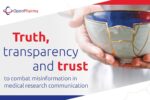This week, we remind readers to complete a survey about the influence of reuse permission on research dissemination, signpost guidance on how to leverage RWE transportability to support JCA and HTA submissions, and explore research demonstrating the real-world impact of regulatory decisions. We share a survey seeking the experiences of patients and caregivers who have been authors on peer-reviewed journal articles, read recommendations for ensuring meaningful engagement with people living with health conditions, and discuss how to protect open science from geopolitics in light of the USA withdrawing from UNESCO. Finally, we highlight OUP’s recent acquisition of Karger Publishers.
To interact with:
Share your experiences with content reuse permissions via Open Pharma
There’s still time to contribute to an Oxford PharmaGenesis survey investigating how content reuse permissions, costs and restrictions affect the dissemination of medical research. The survey, which is open until Monday 17 November 2025, is designed to collect insights from medical publications professionals who regularly obtain content reuse permissions from journals. Share your experiences to contribute to future conversations between the pharma industry, medical communications and publishing fields.
Evidence transportability: how to use RWE across different settings via Becaris Publishing
Evidence transportability involves using discoverable, high-quality real-world evidence (RWE) from other jurisdictions to support decision-making during joint clinical (JCA) or health technology assessments (HTA). This edition of Becaris Publishing’s Evidence Insights, supported by Lumanity, shares guidance, frameworks and case studies for successfully leveraging evidence transportability to strengthen JCA or HTA submissions. Explore the infographic, interview with Meena Venkatachalam (Global Head of RWE Consulting at Lumanity) and white paper to learn more.
Insights from RWE can show the impact of regulatory decisions via Wiley
This recent issue of Pharmacoepidemiology and Drug Safety showcases research into the real-world impact of regulatory decisions. Featuring many open access articles, the issue covers a variety of methods and assessments across a range of health conditions and countries, and it highlights how RWE can be used to aid pharmacovigilance. These insights could help inform future decision-making around regulatory interventions and HTAs.
To engage with:
Share your experiences as a patient or caregiver author via LinkedIn
An international team of patient advocates, researchers, medical writers and patient partnership consultants has launched a survey to gather the experiences of patients and caregivers who have been named authors on peer-reviewed healthcare journal articles. Involving patients and caregivers in the medical research process ensures that lived experiences are understood and respected; yet they are often not included as authors on articles. This survey hopes to clarify the barriers to patient and caregiver authorship, paving the way towards overcoming those barriers and promoting more inclusive research. Share your experiences as a patient or caregiver author to make your voice heard.
To read:
Meaningful engagement: moving from symbolic gestures to true partnerships via Journal of Patient Experience | 9-minute read
‘Nothing about us without us’ is often said to promote the inclusion of people living with health conditions in research and policy. While meaningful engagement offers invaluable insights into health systems, issues – including inadequate compensation – can lead to the perceived tokenization of people with lived experiences. In this article, Mark Barone (Founder of Fórum Intersetorial de CCNTs) and Emma Klatman (Global Policy and Advocacy Manager at Life for a Child) discuss their positive and negative experiences with different engagement settings, and provide four practical recommendations to ensure ethical partnerships and people-centred systems.
Protecting open science from geopolitics via Leiden Madtrics | 9-minute read
The USA recently announced its withdrawal from the United Nations Educational, Scientific and Cultural Organization (UNESCO) from 31 December 2026 due to misalignment between UNESCO’s goals and America First foreign policy. The move highlights how vulnerable open science may be to geopolitics, as policy changes could affect open science activities, initiatives and infrastructures adopted under the UNESCO Recommendation on Open Science. To help protect science, the authors encourage a proactive approach to implementing resilience strategies, such as those suggested by The International Science Council.
OUP to acquire Karger Publishers via Research Information | 2-minute read
Oxford University Press (OUP) has agreed to acquire Karger Publishers, with the acquisition expected to be completed in December 2025. Karger publishes nearly 100 highly regarded journals, 9000 books and a variety of educational and outreach resources to support medical and healthcare professionals. By joining OUP, Karger becomes part of a publishing house that “reflects our values and dedication to high-quality publishing”, states Gabriella Karger (Chairwoman of Karger Publishers). OUP – a department of the University of Oxford – is one of the world’s largest university press publishers and promotes excellence in education, scholarship and research across a range of disciplines.
Enjoy our content? Read last week’s digest and check out our latest quarterly update!
Don’t forget to follow us on Bluesky and LinkedIn for regular updates!


![[[A close-up view of a traditional printing press in operation, showing metal type and inked rollers in motion as printed material is prepared.]]](https://www.openpharma.blog/wp-content/uploads/2025/12/16Dec25-150x100.jpg)

![A person is submerged in a mangrove. Their hands are raised above the water.]]](https://www.openpharma.blog/wp-content/uploads/2025/01/pexels-edurawpro-21588525-150x100.jpg)

